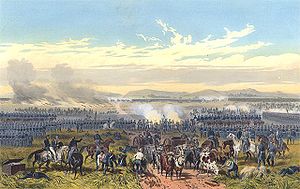Okkamidur War of 1866
| Okkamidur War | |||||||
|---|---|---|---|---|---|---|---|
 The Battle of Abronia, the largest battle of the war. | |||||||
| |||||||
| Belligerents | |||||||
|
|
| ||||||
| Commanders and leaders | |||||||
|
|
| ||||||
The Okkamidur War, often termed the Okkamidur War of 1866 to differentiate it from the later Okkamidur Affair, was a conflict fought between the Sultanate of Okkamidur and the United States of Balion. It was fought throughout the year of 1866 and followed slave unrest in the Balionic territory of South Salorka, a region of Prodava which had been annexed by Balion in 1848. A combination of Okkamiduran political interference, piracy operating out of Okkamidur and Essyria, and strong border tensions led to the breakout of war in February 1866. Though the steadily growing abolitionist movement fiercely opposed war and continued occupation of South Salorka was becoming unpopular, the economic benefits of Balionic-owned plantations in the territory skewed government thinking and there were serious allegations of corruption.
War was declared following the Battle of Karlania, in which Balionic troops fought off a Okkamiduran incursion into South Salorka. A second attempt at Fort Fairweather succeeded and Okkamiduran forces crossed the frontier into South Salorka and marched on Monroweville. The invasion was swift and a series of running battles at Point Silver, New Yellowburg, and Colewood Estate, saw the Balionic garrison forces pushed back towards Monroweville. When the two sides met at the Siege of Monroweville, a stubborn Balionic defence saw the invasion halted at the gates of the territory's capital.
Background
Okkamidur in 1866
Okkamidur had been a nation for many centuries, appearing as a sultanate on Frankenlischian maps as early as 1080, and had established itself as a prominent power on the Prodavan coast in the mid 17th century in the War of the Four Sultans and the South Orion War. A series of jihads and counter-crusades between the Muslims of north-east Prodava and the Abrahamic peoples of Frankenlisch and Vionna had seen this power wane in the late 18th century but by the mid-19th century this power was returning swiftly. Wide-reaching administrative reforms during the reign of Abdul the Wise had overhauled the inefficient Okkamiduran government structure, created a modern civil service, and put an end to corruption and widespread nepotism in the Okkamiduran standing army, the Mansures. The Ghilanis however, Okkamidur's conscript army raised during wartime, remained in the pocket of landowners, noblemen, and foreign adventurers.